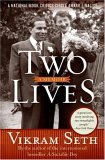Book Club Discussion Questions
In a book club? Subscribe to our Book Club Newsletter!
For supplemental discussion material see our Beyond the Book article, and our BookBrowse Review of Two Lives.
Please be aware that this discussion guide will contain spoilers!
Spanning almost the entire breadth of the twentieth-century, the life,
friendship and marriage of Shanti Seth and Helga "Henny" Caro bookend a
particularly violent slice of European history included the Second World War,
the Holocaust, the collapse of imperialism in Europe and Asia and the division
of Germany and the Middle East. The unlikely coupling and five-decade-long love
affair between this European-educated Indian dentist and German-bred Jewish
woman form the centerpiece of acclaimed author Vikram Seth's dual-biography of
his beloved Aunt and Uncle—and provides a stunning meditation on the resiliency
of an entire generation that experienced firsthand the depths of human cruelty
and horror.
Two Lives is more than just a simple tale of two people brought
together by extraordinary circumstances and events, however. It is also a
beautifully etched work that redefines the modern biography, weaving together a
pair of individual narratives to comprise a singular love story—one that manages
to thrive despite the horrors of war, the devastation of the Holocaust and the
betrayal of friends who make the most unforgivable choices. Relying on
interviews, private letters and over ten years of research,
Two Lives is
Vikram Seth's masterful tribute to his Aunt and Uncle, and takes readers on a
remarkable ride from 1920s India, to Berlin during the Third Reach, all the way
up to present-day England.
Questions for discussion:
- How would you characterize the relationship between Shanti Seth and
Henny Caro? Would you call their relationship one of true love or of simple,
if devoted, companionship and mutual support?
- The author writes: "with so much suffering, isolation and indifference,
it is cause for gratitude that something is sufficiently good." How do you
feel this view of "sufficiently good" manifested itself in Shanti and
Henny's lives—both as a couple and as individuals?
- How did you see Shanti and Henny's interracial, interfaith relationship
in the context of the social climates they lived through (particularly in
Germany and England)? Did it surprise you that both Shanti and Henny made
very little mention about the difficulties that racial, ethnic and religious
barriers must have played in their relationship?
- It has been written that this dual biography uncovers the
"extraordinary" in the "ordinary" lives of its two subjects. Do you consider
Shanti and Henny's lives to be "ordinary?"
- Why do you think Shanti refused to look at the letters his wife kept,
once the author discovered them locked in a trunk in the attic? Do you think
his refusal was made out of respect for his wife's privacy or for some other
reason?
- How differently would Henny's life have been portrayed in the book if
she had been able to tell her own side of the story, as opposed to having it
divined from intimate letters that she most likely meant to keep private?
- Did you feel any sense of sympathy for Hans Mahnert and Lili Wurth? Why
or why not?
- What did you make of Eva Cohn's relationship with Henny? What about her
relationship with Fred Gotte?
- The idea of home—from nationality to the very house in which you
live—plays a key role in each of the narratives in the book. How do you
think Shanti, Henny and the author define "home" for themselves? Does this
help explain the author's violent reaction to his Uncle's will at the close
of the book?
- The author titled his book Two Lives but also calls it a memoir.
How does the term "two lives" apply to both Shanti and Henny's separate life
stories? Does the term also apply to the author's life story?
Unless otherwise stated, this discussion guide is reprinted with the permission of Harper Perennial.
Any page references refer to a USA edition of the book, usually the trade paperback version, and may vary in other editions.
